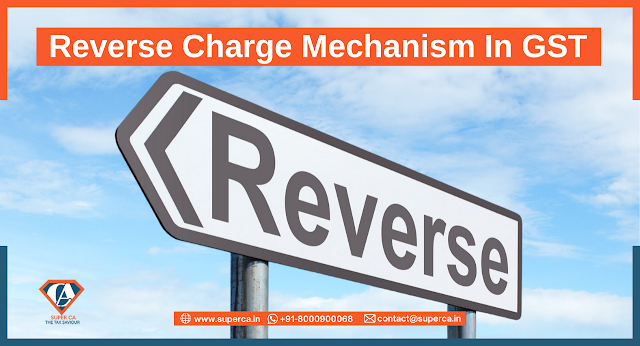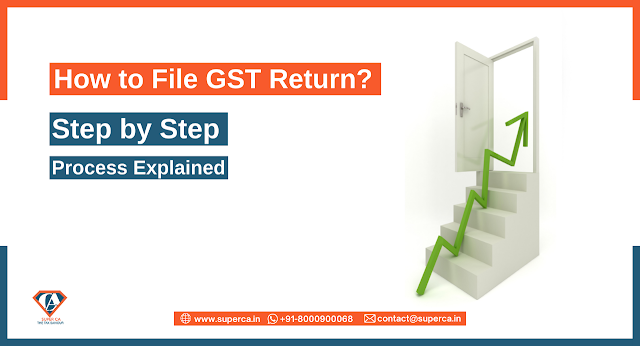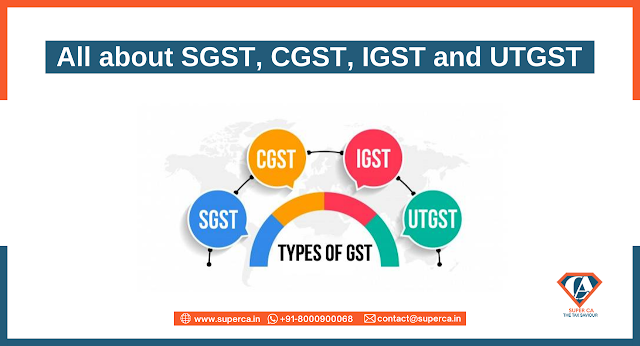Reverse Charge Mechanism in GST
It is always the case where the supplier of goods and services is liable to pay the GST. But, when it comes to Reverse Charge Mechanism, the receiver of goods and services has to pay the tax, meaning that the tax liability is reversed. Reverse Charge means the liability to pay tax while GST return filing is on the recipient of supply of goods or services instead of the supplier of such goods or services in respect of notified categories of supply.
According to the normal GST return filing procedure, the supplier sells goods/services to the receiver and the latter pays the former for the same. This payment also includes GST, which the supplier then pays to the government. But, in the case of the Reverse Charge Mechanism in GST, tax is paid by the receiver directly to the government; it does not go through the supplier and is not part of the exchange of goods/services.
When is a reverse charge applicable?
Several acts govern the reverse charge scenarios for intrastate transactions. Section 9(3), 9(4) and 9(5) of Central GST and State GST deal with it. Also, sections 5(3), 5(4) and 5(5) of the Integrated GST Act govern the reverse charge scenarios for inter-state transactions. Let’s take a closer look at these scenarios.
Supplies of goods under reverse charge mechanism:
|
|
Description of supply of Goods |
Supplier |
Recipient |
|
1 |
Cashew nuts, not shelled or peeled |
Agriculturist |
Any registered person |
|
2 |
Bidi wrapper leaves (tendu) |
Agriculturist |
Any registered person |
|
3 |
Tobacco leaves |
Agriculturist |
Any registered person |
|
4 |
Silk yarn |
Any person who manufactures silk yarn from raw silk or silkworm cocoons for supply of silk yarn |
Any registered person |
|
4A |
Raw cotton |
Agriculturist |
Any registered person. |
|
5 |
Supply of lottery |
State Government, Union Territory or any local authority |
Lottery distributor or selling agent |
|
6 |
Used vehicles, seized and confiscated goods, old and used goods, waste and scrap |
Central Government, State Government, Union territory or a local authority |
Any registered person |
Supplies of services under reverse charge mechanism
|
|
Description of supply of Service |
Supplier |
Recipient |
|
1 |
Any service supplied by any person who is located in a non-taxable territory to any person other than nontaxable online recipient. |
Any person located in a non-taxable Territory |
Any person located in the taxable territory other than nontaxable online Recipient. |
|
2 |
GTA Services |
Goods Transport Agency (GTA) who has not paid integrated tax at the rate of 12% |
Any factory, society, cooperative society, registered person, body corporate, partnership firm, casual taxable person; located in the taxable territory |
|
3 |
Legal Services by advocate |
An individual advocate including a senior advocate or firm of advocates |
Any business entity located in the taxable territory |
|
4 |
Services supplied by an arbitral tribunal to a business entity |
An arbitral tribunal |
Any business entity located in the taxable territory |
|
5 |
Services provided by way of sponsorship to anybody corporate or partnership firm |
Any person |
Anybody corporate or partnership firm located in the taxable territory |
|
6 |
Services supplied by the Central Government, State Government, Union territory or local authority to a business entity excluding, -(1) renting of immovable property, and (2) services specified below- (i) services by the Department of Posts by way of speed post, express parcel post, life insurance, and agency services provided to a person other than Central Government, State Government or Union territory or local authority; (ii) services in relation to an aircraft or a vessel, inside or outside the precincts of a port or an airport; (iii) transport of goods or passengers. |
Central Government, State Government, Union territory or local authority |
Any business entity located in the taxable territory |
|
7 |
Services supplied by a director of a company or a body corporate to
the said company or the body corporate |
A director of a company or a body corporate |
The company or a body corporate located in the taxable territory |
|
8 |
Services supplied by an insurance agent to any person carrying on insurance business |
An insurance agent |
Any person carrying on insurance business, With active GST return filing going on. |
|
9 |
Services supplied by a recovery agent to a banking company or a financial institution or a non-banking financial company |
A recovery agent |
A banking company or a financial institution or a non-banking financial company, located in the taxable territory |
|
10 |
Services supplied by a person located in non-taxable territory by way of transportation of goods by a vessel from a place outside India up to the customs station of clearance in India |
A person located in non-taxable Territory not liable to GST return filing |
Importer, as defined in clause (26) of section 2 of the Customs Act, 1962(52 of 1962), located in the taxable territory |
|
11 |
Supply of services by an author, music composer, photographer, artist or the like by way of transfer or permitting the use or enjoyment of a copyright covered under section 13(1) a) of the Copyright Act, 1957 relating to original literary, dramatic, musical or artistic works to a publisher, music company, producer or the like |
Author or music composer, photograph her, artist, or the like |
Publisher, music company, producer or the like, located in the taxable territory |
|
12 |
Supply of services by the members of Overseeing Committee to Reserve Bank of India |
Members of Overseeing Committee constituted by the Reserve Bank of India |
Reserve Bank of India. |
Time of supply under reverse charge mechanism (RCM)
The time of supply under GST means a particular point of time when the goods or services are supplied or provided. Using the time of supply, you can find the tax rate applicable on goods or services, the person liable to pay tax and due dates for paying GST and GST return filing. Under the reverse charge mechanism, the method to determine the time of supply is different for goods and services.
In the case of goods supplied under RCM, the time of supply will be the earliest of the following dates:
-Date of receipt of goods
-Date immediately after 30 days from the date of issue of an invoice by the supplier
In the case of services rendered under RCM, the time of supply will be the earliest of the following dates:
-Date of payment
-Date immediately after 60 days from the date of issue of invoice by the supplier
In case, the time of supply cannot be
determined under the given conditions above, then the time of supply will be
the date of entry in the books of account of the recipient.
RCM Provisions Under GST Return filing Forms – GSTR 1 – GSTR 2
In case the supplier is registered, but the goods or services come under a reverse charge mechanism, ITC cannot be claimed by the supplier as the tax is not credited by him but the receiver is paying the taxes. In the case of importers of goods, taxes need to be paid under a reverse charge mechanism to the Government on the import while GST return filing.
The details of the charges pertaining to the inward supply of goods or services are to be mentioned in the GST Return filing form 1. The details of inward supply are stated in GST Return filing form 2. Further, the person needs to get registered under GST irrespective of the turnover, if he/she is liable to pay tax under the reverse charge mechanism
Final Words
The main purpose of the reverse charge
mechanism is to collect indirect tax easily and conveniently from the recipient
while GST return filing so as to increase tax revenues more effectively in
cases where the supplier of particular goods or services is situated in
non-taxable territories or not well versed with the tax laws.





Comments
Post a Comment